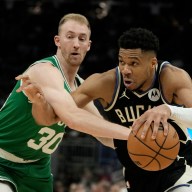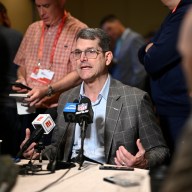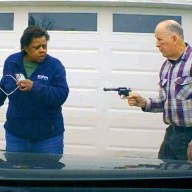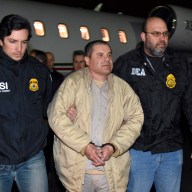 Robert Altman poses with a camera circa 1974.
Robert Altman poses with a camera circa 1974.
Credit: Hulton Archive/Getty Images
When Robert Altman made the movie “M.A.S.H.” in 1970, it looked (and sounded) so different from movies of the time that the studio wasn’t sure what it had. But the public loved it. So began an improbably iconoclastic film career, one that began with a long teeth-cutting experience directing television and continued into a career of uncompromising classics like “Nashville,” “The Player” and “Gosford Park.” A new documentary, called simply “Altman,” premieres Wednesday on EPIX. Here, his wife and one of his actors/producers reflect on what made him special.
 Kathryn Altman is seen with her husband Robert in this 2002 photo.
Kathryn Altman is seen with her husband Robert in this 2002 photo.
Credit: Getty Images
Kathryn Altman, his wife
His personal fave: “All of his movies were his favorite movies.”
How he worked large casts: Many of Altman’s films featured sprawling ensembles, which were observed as they interacted. He had a knack for getting that mass chemistry going. “He loved the cast to all get to know each other,” she says. Every night would end with everyone watching the dailies, the day’s rough footage. “We’d set up this big thing with booze and food, and people would come out exhausted after the day’s work. Everyone loved it, except for Julie Christie. He wanted one actor to know what the others were doing, to get to know each other and know their characters. It made for an unusual environment because nobody was really used to it. And it worked. I’m surprised more directors don’t do it. He would bring anyone to watch [the dailies]. He’d grab people off the street.”
The moment they met: She was a bit player on a show he was directing. “It was instantaneous. I stepped off a bus, he made some wise crack, I made one back. He asked me, ‘May I buy you a cappuccino?’ He took the coffee and milk and mixed them, as a kind of joke that directors don’t speak to the background actors in those days. They didn’t have time! Six weeks later we were married and pregnant. We were married 47 years.”
His struggles to get films made: Altman said later in his life that he was more lucky than most: He always had projects. But he didn’t always feel lucky. “It wasn’t easy,” she counters. “Every film had a problem with it. Many times they just fell through completely. You couldn’t get a hold of the guy that said he was going to send the money because he lives in a boat outside jurisdiction…”
 Bob Balaban collaborated with Robert Altman on the film “Gosford Park.”
Bob Balaban collaborated with Robert Altman on the film “Gosford Park.”
Credit: Getty Images
Bob Balaban, actor/producer on ‘Gosford Park’
Altman’s small big movies: “As successful as he was, he always made little independent movies. It didn’t matter if they would gross $100 million. It didn’t change him at all. He just did what he was doing in the beginning,” Balaban says of the man who he first met while auditioning for 1970’s “Brewster McCloud.” (He didn’t get the part but they stayed in touch.) “And nobody could understand. They’d ask him, ‘Your last movie made so much money, why are you making this movie nobody will go see?’ And he said he never planned on people coming to see his movies. He just made movies.”
Staying small: “When people give you money they want to control you. They never want you to waste their money. On the other hand they’re hiring an artist to make something,” he explains. “With ‘Gosford Park,’ somebody was going to give Robert five or eight million dollars more than we needed. And they said, ‘Oh, there’s one condition: I want you to rewrite the ending of the movie.’”
The controlled chaos of his ensemble films:“That’s the magic trick: You believe it’s chaos you’re watching. He could just deal with lots of people talking,” he says. “On the first day of ‘Gosford Park’ we had a scene with 26 people. We rehearsed for six hours. It was a real rehearsal. He molded us like we were clay. But we didn’t know where the camera was going to be, if we were in the shot, if we were off-camera. We didn’t know what was happening. And you go see the movie and it’s the best shot with 26 people in it that you could imagine.”
 Bob Balaban played a Hollywood producer visiting an English estate in “Gosford Park.”
Bob Balaban played a Hollywood producer visiting an English estate in “Gosford Park.”
Credit: Provided
Making it up as he went along: “M.A.S.H.” famously ignored most of the script Ring Lardner Jr. had written for it. But some, like “Gosford Park,” were more scripted. Even on that, though, he changed things. Ryan Phillippe’s character, Balaban reveals, was originally supposed to be played by a U.K. actor. And Eileen Atkins and Helen Mirren weren’t originally playing sisters until Altman saw them both in costume and saw how similar they looked. Jeremy Northam’s character — as real-life movie star/musician Ivor Novello — wasn’t added until six weeks prior to shooting. “And he’s the centerpiece of the movie,” Balaban says. “His songs are so emotional and they carry through the entire movie.”
Altman was happy onset: “It was the most natural thing for him to be with actors. They love he felt you felt. It was so happy to be on the set. It was like a birthday party all the time,” he says. That’s Balaban’s preferred way of working. “The greatest tragedies, they don’t always benefit from a tragic atmosphere. I think people do their best work when they feel happy and relaxed.”
Metro’s Top 6 Altmans
“McCabe & Mrs. Miller” (1971)
“The Long Goodbye” (1973)
“California Split” (1974)
“3 Women” (1977)
“Tanner ’88” (1988)
“Gosford Park” (2001)
Follow Matt Prigge on Twitter @mattprigge
















